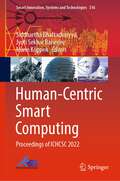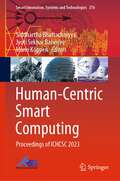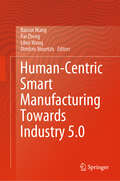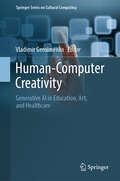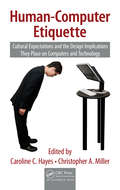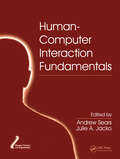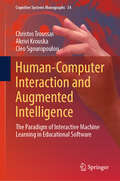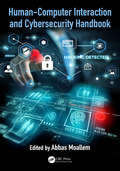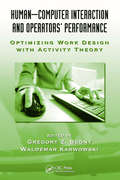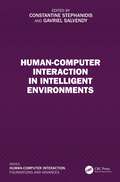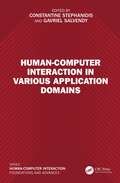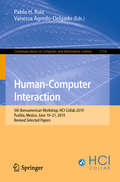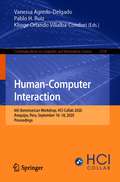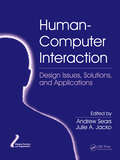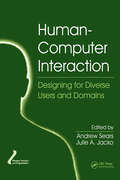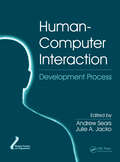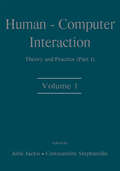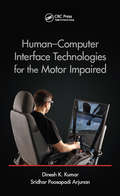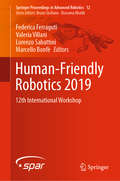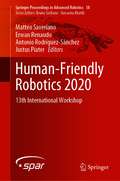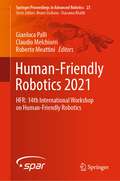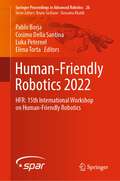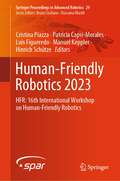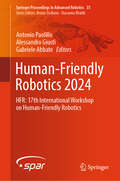- Table View
- List View
Human-Centric Smart Computing: Proceedings of ICHCSC 2022 (Smart Innovation, Systems and Technologies #316)
by Mario Köppen Siddhartha Bhattacharyya Jyoti Sekhar BanerjeeThis book includes high-quality research papers presented at the First International Conference on Human-Centric Smart Computing (ICHCSC 2022), organized by the University of Engineering and Management, Jaipur, India, on 27–29 April 2022. The topics covered in the book are human-centric computing, hyper connectivity, and data science. The book presents innovative work by leading academics, researchers, and experts from industry.
Human-Centric Smart Computing: Proceedings of ICHCSC 2023 (Smart Innovation, Systems and Technologies #376)
by Mario Köppen Siddhartha Bhattacharyya Jyoti Sekhar BanerjeeThis book includes high-quality research papers presented at the Second International Conference on Human-Centric Smart Computing (ICHCSC 2023), organized by the University of Engineering and Management, Jaipur, India, on 5–6 July 2023 in New Delhi, India. The topics covered in the book are human-centric computing, hyper connectivity, and data science. The book presents innovative work by leading academics, researchers, and experts from industry.
Human-Centric Smart Manufacturing Towards Industry 5.0
by Lihui Wang Dimitris Mourtzis Baicun Wang Pai ZhengThis book presents a set of innovative solutions to human-centric manufacturing systems, offering critical insights and comprehensive application guidelines for understanding how to realize human-centric smart manufacturing by exerting its power and influence towards Industry 5.0. While human-centric manufacturing possesses a substantial and growing body of knowledge, there are distinct research gaps that are not sufficiently addressed. With the development of enabling technologies, it is necessary to propose more precise, robust, and practical approaches in support of smart manufacturing towards Industry 5.0. As a response to the new research opportunities, this book presents and highlights the latest development on applying advanced techniques in human-centric manufacturing. The book will be of interest to a broad readership, from academic researchers to practicing engineers
Human-Computer Creativity: Generative AI in Education, Art, and Healthcare (Springer Series on Cultural Computing)
by Vladimir GeroimenkoThis pioneering volume showcases how generative AI has evolved from a mere tool to a creative partner, transforming the boundaries of innovation and collaboration across various disciplines. With contributions from 53 global experts spanning 21 countries, this comprehensive resource explores the transformative impact of AI on education, art, and healthcare. It reveals how AI enhances learning experiences, fosters new artistic expressions, and revolutionises patient care and medical research. Organised into five thematic parts, the book offers a balanced mix of conceptual frameworks, case studies, and practical insights, providing readers with a thorough understanding of how human ingenuity and artificial intelligence intersect to solve problems, inspire creativity, and redefine industries. Whether you are an academic, practitioner, or inquisitive reader, this volume invites you to engage with the cutting-edge possibilities of generative AI and embrace the future of human-computer collaboration.
Human-Computer Etiquette: Cultural Expectations and the Design Implications They Place on Computers and Technology (Supply Chain Integration Modeling, Optimization and Application)
by Caroline C. Hayes Christopher A. MillerWritten by experts from various fields, this edited collection explores a wide range of issues pertaining to how computers evoke human social expectations. The book illustrates how socially acceptable conventions can strongly impact the effectiveness of human-computer interactions and how to consider such norms in the design of human-computer inter
Human-Computer Interaction Fundamentals (Human Factors and Ergonomics)
by Julie A. Jacko Andrew SearsHailed on first publication as a compendium of foundational principles and cutting-edge research, The Human-Computer Interaction Handbook has become the gold standard reference in this field. Derived from select chapters of this groundbreaking and authoritative resource, Human-Computer Interaction Fundamentals emphasizes emerging topics such as sen
Human-Computer Interaction and Augmented Intelligence: The Paradigm of Interactive Machine Learning in Educational Software (Cognitive Systems Monographs #34)
by Christos Troussas Akrivi Krouska Cleo SgouropoulouThis book explores the transformative roles of human-computer interaction (HCI) and augmented intelligence (AI) in shaping intelligent systems. HCI focuses on designing interactive systems that enhance human-technology relationships, while AI empowers users with adaptive, data-driven tools that complement decision-making. Together, these fields drive innovation, creating systems that are efficient, intuitive, and inclusive, addressing diverse user needs across various domains. Central to this work is the paradigm of interactive machine learning (IML), which builds on HCI and AI principles to create adaptive systems capable of evolving in real-time. The book highlights the application of IML in educational software, demonstrating how dynamic, personalized, and responsive learning environments can enhance student engagement and success. It provides detailed case studies and practical examples that showcase how IML aligns educational content, feedback, and interactions with learner behaviors and preferences. Additionally, it includes numerous Python code implementations and actionable design strategies, making these concepts accessible to practitioners and researchers alike. Key topics include leveraging cognitive and communication styles to shape adaptive systems, integrating learning models to enhance personalization, and addressing ethical considerations such as data privacy and algorithmic fairness. Readers will also discover discussions on creating personalized tutoring systems, collaborative platforms, and immersive environments that redefine educational technology. This book is a valuable resource for researchers, software developers, educators, instructional designers, and technologists at the intersection of human-computer interaction, augmented intelligence, and educational innovation. With its comprehensive framework and practical insights, it offers the tools to design adaptive, inclusive, and impactful learning systems for the future.
Human-Computer Interaction and Cybersecurity Handbook (Human Factors and Ergonomics)
by Abbas Moallem<P><P>Recipient of the SJSU San Jose State University Annual Author & Artist Awards 2019 <P><P>Recipient of the SJSU San Jose State University Annual Author & Artist Awards 2018 <P><P>Cybersecurity, or information technology security, focuses on protecting computers and data from criminal behavior. The understanding of human performance, capability, and behavior is one of the main areas that experts in cybersecurity focus on, both from a human–computer interaction point of view, and that of human factors. This handbook is a unique source of information from the human factors perspective that covers all topics related to the discipline. It includes new areas such as smart networking and devices, and will be a source of information for IT specialists, as well as other disciplines such as psychology, behavioral science, software engineering, and security management. <P><P>Features <li>Covers all areas of human–computer interaction and human factors in cybersecurity <li>Includes information for IT specialists, who often desire more knowledge about the human side of cybersecurity <li>Provides a reference for other disciplines such as psychology, behavioral science, software engineering, and security management <li>Offers a source of information for cybersecurity practitioners in government agencies and private enterprises <li>Presents new areas such as smart networking and devices
Human-Computer Interaction and Operators' Performance: Optimizing Work Design with Activity Theory
by Waldemar Karwowski Gregory Z. BednyA collection of works authored by leading scientists from the US and Russia, Human-Computer Interaction and Operators' Performance: Optimizing Work Design with Activity Theory describes applied and systemic-structural activity theory as it is used to study human-computer interaction, aviation, design, and training. Important from a theoretical and
Human-Computer Interaction in Intelligent Environments: 5th International Conference, Uahci 2009, Held As Part Of Hci International 2009, San Diego, Ca, Usa, July 19-24, 2009. Proceedings, Part Ii (Lecture Notes In Computer Science Ser. #5615)
by Gavriel Salvendy Constantine StephanidisThis book offers readers a holistic understanding of intelligent environments, encompassingtheir definition, design, interaction paradigms, the role of Artificial Intelligence (AI), and theassociated broader philosophical and procedural aspects. Elaborates on AI research and the creation of intelligent environments. Zooms in on designing interactions with the IoT, intelligent agents and robots. Discusses overarching topics for the design of intelligent environments, including user interface adaptation, design for all, sustainability, cybersecurity, privacy and trust. Provides insights into the intricacies of various intelligent environment contexts, such as in automotive, urban interfaces, smart cities and beyond. This book has been written for individuals interested in Human-Computer Interaction research and applications.
Human-Computer Interaction in Various Application Domains
by Gavriel Salvendy Constantine StephanidisHuman-Computer Interaction (HCI) is a multidisciplinary research and applied field targeted to studying people interacting with information technology and designing usable and efficient systems for them. This book outlines the state‑of‑the‑art of HCI research in the respective domain such as health, games, transportation, industry, and entertainment.This book Bridges the gap between theory and practice by presenting how to apply HCI methods and tools in specific domains. Offers concrete examples of HCI use in real-world situations. Presents case-specific best practices, tips, and tricks. Includes chapters that are well-studied and purposefully selected, representing important theoretical, practical, and research areas in HCI. Includes domains ranging from the roots and the classic approaches of human-computer interaction to contemporary advancements. This book is a fascinating read for individuals interested in Human-Computer Interaction research and applications.
Human-Computer Interaction: 5th Iberoamerican Workshop, HCI-Collab 2019, Puebla, Mexico, June 19–21, 2019, Revised Selected Papers (Communications in Computer and Information Science #1114)
by Vanessa Agredo-Delgado Pablo H. RuizThis book constitutes the proceedings of the 5th Iberoamerican Workshop on Human-Computer Interaction, HCI-Collab 2019, held in Puebla, Mexico, in June 2019.The 31 full papers presented in this volume were carefully reviewed and selected from 55 submissions. The papers describe models, design patterns, implementations, evaluations of existing applications, and systemic reviews; all of which are very important aspects within HCI.
Human-Computer Interaction: 6th Iberomarican Workshop, HCI-Collab 2020, Arequipa, Peru, September 16–18, 2020, Proceedings (Communications in Computer and Information Science #1334)
by Vanessa Agredo-Delgado Pablo H. Ruiz Klinge Orlando Villalba-CondoriThis book constitutes the thoroughly refereed proceedings of the 6th Iberoamerican Workshop on Human-Computer Interaction, HCI-Collab 2020, held in Arequipa, Peru, in September 2020.*The 28 full and 3 short papers presented in this volume were carefully reviewed and selected from 128 submissions. The papers deal with topics such as emotional interfaces, usability, video games, computational thinking, collaborative systems, IoT, software engineering, ICT in education, augmented and mixed virtual reality for education, gamification, emotional Interfaces, adaptive instruction systems, accessibility, use of video games in education, artificial Intelligence in HCI, among others. *The workshop was held virtually due to the COVID-19 pandemic.
Human-Computer Interaction: Design Issues, Solutions, and Applications (Human Factors and Ergonomics)
by Julie A. Jacko Andrew SearsHailed on first publication as a compendium of foundational principles and cutting-edge research, The Human-Computer Interaction Handbook has become the gold standard reference in this field. Derived from select chapters of this groundbreaking resource, Human-Computer Interaction: Design Issues, Solutions, and Applications focuses on HCI from a pri
Human-Computer Interaction: Designing for Diverse Users and Domains (Human Factors and Ergonomics)
by Julie A. Jacko Andrew SearsHailed on first publication as a compendium of foundational principles and cutting-edge research, The Human-Computer Interaction Handbook has become the gold standard reference in this field. While human-computer interaction may have emerged from within computing, significant contributions have come from a variety of fields including industrial engineering, psychology, education, and graphic design. No where is this more apparent then when designing solutions for users as diverse as children, older adults, and individuals with physical, cognitive, visual, or hearing impairments. Derived from select chapters in The Human-Computer Interaction Handbook, this volume emphasizes design for these groups and also discusses HCI in the context of specific domains including healthcare, games, and the aerospace industry.
Human-Computer Interaction: Development Process (Human Factors and Ergonomics)
by Julie A. Jacko Andrew SearsHailed on first publication as a compendium of foundational principles and cutting-edge research, The Human-Computer Interaction Handbook has become the gold standard reference in this field. Derived from select chapters of this groundbreaking resource, Human-Computer Interaction: The Development Practice addresses requirements specification, desig
Human-Computer Interaction: Theory and Practice (part 1), Volume 1 (Human Factors and Ergonomics)
by Constantine Stephanidis Julie JackoThis four volume set provides the complete proceedings of the 10th International Conference on Human-Computer Interaction held June, 2003 in Crete, Greece. A total of 2,986 individuals from industry, academia, research institutes, and governmental agencies from 59 countries submitted their work for presentation at the conference. The papers address the latest research and development efforts, as well as highlight the human aspects of design and use of computing systems. Those accepted for presentation thoroughly cover the entire field of human-computer interaction, including the cognitive, social, ergonomic, and health aspects of work with computers. The papers also address major advances in knowledge and effective use of computers in a variety of diversified application areas, including offices, financial institutions, manufacturing, electronic publishing, construction, health care, and disabled and elderly people.
Human-Computer Interface Technologies for the Motor Impaired (Rehabilitation Science In Practice Ser.)
by Dinesh K. Kumar Sridhar Poosapadi ArjunanHuman Computer Interface Technologies for the Motor Impaired examines both the technical and social aspects of human computer interface (HCI). Written by world-class academic experts committed to improving HCI technologies for people with disabilities, this all-inclusive book explores the latest research, and offers insight into the current limitat
Human-Friendly Robotics 2019: 12th International Workshop (Springer Proceedings in Advanced Robotics #12)
by Federica Ferraguti Valeria Villani Lorenzo Sabattini Marcello BonfèThis book covers a wide range of topics related to human–robot interaction, both physical and cognitive, including theories, methodologies, technologies, and empirical and experimental studies. The International Workshop on Human-Friendly Robotics (HFR) is an annual meeting that brings together academic scientists, researchers and research scholars to present their latest, original findings on all aspects concerning the introduction of robots into everyday life. The growing need to automate daily tasks, combined with new robot technologies, is driving the development of human-friendly robots, i.e., safe and dependable machines that operate in close proximity to humans or directly interact with them in a wide range of contexts. The technological shift from classical industrial robots, which are safely kept away from humans in cages, to robots that are used in close collaboration with humans, is faced with major challenges that need to be overcome. The objective of the workshop was to stimulate discussion and exchange knowledge on design, control, safety and ethical issues concerning the introduction of robots into everyday life. The 12th installment was organized by the University of Modena and Reggio Emilia and took place in Reggio Emilia, Italy.
Human-Friendly Robotics 2020: 13th International Workshop (Springer Proceedings in Advanced Robotics #18)
by Matteo Saveriano Erwan Renaudo Antonio Rodríguez-Sánchez Justus PiaterThis book presents recent methodological, technological, and experimental developments concerning human-friendly robots and their introduction into everyday life. The book contains a selection of 10 papers presented at the 13th edition of the International Workshop on Human-Friendly Robotics (HFR). The International Workshop on Human-Friendly Robotics (HFR) is an annual meeting that brings together academic scientists, researchers, and research scholars to present their latest, original findings on all aspects concerning human-friendly robotics where safe and dependable machines operate in close proximity to humans or directly interact with them in a wide range of contexts. The 13th edition was organized by the University of Innsbruck and took place in Innsbruck, Austria. The book is primarily intended for robotics researchers and postgraduates which are doing or willing to do research in fields related to human-friendly robotics, including human–robot interaction, robot control, robot learning, and intuitive interfaces. .
Human-Friendly Robotics 2021: HFR: 14th International Workshop on Human-Friendly Robotics (Springer Proceedings in Advanced Robotics #23)
by Gianluca Palli Claudio Melchiorri Roberto MeattiniThis book is a collection of research results in a wide range of topics related to human–robot interaction, both physical and cognitive, including theories, methodologies, technologies, and empirical and experimental studies. The works contained in the book have been presented at the 14th International Workshop on Human-Friendly Robotics (HFR 2021), organized by the University of Bologna (Bologna, Italy, October 28–29, 2021), and they describe the most original achievements in the field of human–robot interaction coming from the ideas of young researchers. The intended readership of the book is any researcher in the field of robotics interested to research problems related to human–robot coexistence, like robot interaction control, robot learning, and human–robot co-working.
Human-Friendly Robotics 2022: HFR: 15th International Workshop on Human-Friendly Robotics (Springer Proceedings in Advanced Robotics #26)
by Pablo Borja Cosimo Della Santina Luka Peternel Elena TortaThis book contains seventeen contributions in the form of independent chapters, covering a broad range of topics related to human–robot interaction at physical and cognitive levels. Each chapter represents a novel piece of work presented during HFR 2022 by researchers in the different areas of robotics, where new theories, methodologies, technologies, challenges, and empirical and experimental studies are discussed. Additionally, this compilation is rich in viewpoints due to the multidisciplinary nature of its authors. Hence, this book represents an excellent opportunity for academics, researchers, and industry partners to get acquainted with the most recent work on human–robot interaction.
Human-Friendly Robotics 2023: HFR: 16th International Workshop on Human-Friendly Robotics (Springer Proceedings in Advanced Robotics #29)
by Hinrich Schütze Cristina Piazza Patricia Capsi-Morales Luis Figueredo Manuel KepplerComprising sixteen independent chapters, this book covers recent advancements and emerging pathways within human-friendly robotics on physical and cognitive levels. Each chapter presents a novel work presented at HFR 2023 by researchers from various robotic domains, where new theories, methodologies, technologies, challenges, and empirical and experimental studies are discussed. The multidisciplinary nature of the authors enriches the compilation with varied viewpoints, making it an excellent resource for academics, researchers, and industry professionals to get acquainted with the state of the art on human-robot interaction.
Human-Friendly Robotics 2024: HFR: 17th International Workshop on Human-Friendly Robotics (Springer Proceedings in Advanced Robotics #35)
by Antonio Paolillo Alessandro Giusti Gabriele AbbateThis book covers a wide range of topics related to human-robot interaction, both physical and cognitive, including theories, methodologies, technologies, and experimental studies. An increasing number of robots operate closely with humans and are expected to interact with people in everyday life, such as patients in hospitals, children in schools, or elderly people in domestic environments. New generations of human-friendly robots must meet the needs of these non-expert users, ensuring safety and trustworthiness both physically and cognitively. To realize this vision, the International Workshop on Human-Friendly Robotics (HFR) provides an opportunity for academic, research, and industry experts to exchange and share their experiences and achievements related to the integration of robots into everyday life. The 17th edition of HFR took place in Lugano, Switzerland, on September 30 and October 1, 2024, and organized by Dalle Molle Institute for Artificial Intelligence (IDSIA), USI-SUPSI.
Human-Insect Interactions
by Sergey GovorushkoThis book presents a 360-degree picture of the world of insects and explores how their existence affects our lives: the "good, bad, and ugly" aspects of their interactions with humankind. It provides a lucid introductory text for beginning undergraduate students in the life sciences, particularly those pursuing beginner courses in entomology, agriculture, and botany.
